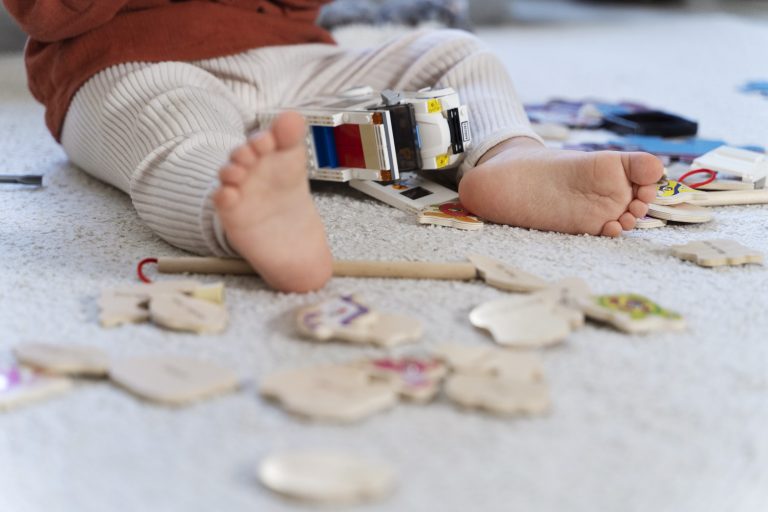When a baby is born, the world becomes a vast, exciting space to explore. In the first few months, everything is new: the lights, the sounds, the movements – and, of course, their own body. During this time, parents often watch eagerly, wondering when their little one will roll over for the first time, start crawling, sitting up, or walking. While it’s natural to look forward to these milestones with excitement, it’s important to remember that every baby develops at their own pace – and that’s perfectly okay.
Individual Development Paths – There’s No Single “Right” Timeline
Infant motor development is incredibly diverse. Some babies may start rolling over actively at four months, while others discover this ability later. Some may skip certain stages altogether – for example, they might not crawl but go straight to standing up. While this can sometimes worry parents, skipping stages doesn’t necessarily indicate a problem.
Motor development isn’t a race; it’s a personal journey of discovery. Just as adults don’t all learn to ride a bike, swim, or cook in the same way or at the same speed, babies also acquire movement skills at different paces and in unique ways. That’s why patience is key, and comparing our child to others should be avoided.
Professional Support with Empathy
Of course, there are cases where a baby’s motor development deviates significantly from the average, warranting professional intervention. In such situations, physiotherapy can be highly beneficial – but it’s crucial that this support focuses not on “speeding things up,” but rather on understanding and guiding the child’s development.
Pediatric physiotherapy is most effective and compassionate when it considers the baby’s current state – both physically and emotionally. A fussy, sleepy, or shy baby will respond differently to stimuli than a curious, energetic one. Factors like age-specific characteristics, nervous system maturity, and emotional well-being all play a critical role in determining how best to approach development.
The Foundation of Connection
The most important thing a baby can feel during physical activities is safety. This sense of security comes from the caregiver’s and therapist’s attentiveness, empathy, and acceptance. When a baby feels supported rather than pressured to perform, they’re more likely to engage joyfully in the process.
Motor development shouldn’t become a source of stress – neither for the baby nor the parents. Instead, it’s an opportunity to better understand each other and connect in a new way. For a baby, every movement, every new skill, is a form of communication: “Look what I can do!” or “Help me, I’m still unsure.”
Ultimately: Trust Your Baby – and Yourself
A baby’s body and mind instinctively know what they need and when. As adults, our role is to accompany them on this journey – not to rush or compare, but to do so with love, patience, and attention. After all, this is the true engine of development.
When Should You Consult a Physiotherapist?
While every baby develops at their own pace, there are situations where consulting a specialist can be helpful – not necessarily because something is “wrong,” but because a little support can make the developmental process smoother.
Here are some examples of when it might be worth seeing a pediatric physiotherapist:
- If the baby consistently turns their head only to one side – this could simply be a habit, but if it persists, it might affect posture and motor development.
- If the baby dislikes being on their tummy or cries in this position – tummy time is crucial for developing core muscles and coordination, so it’s worth exploring what might be causing resistance.
- If the baby noticeably favors one side over the other – for instance, always reaching with the same hand or turning only to one side.
- If, around six months old, the baby hasn’t attempted to roll over – this doesn’t necessarily mean there’s a problem, but gentle guidance through play and expert advice can encourage the movement to emerge.
- If the baby’s muscle tone seems unusual – either too loose or too tight. Often, this is just a minor deviation that can be corrected with targeted exercises and playful activities.
- If you feel uncertain for any reason – parental intuition is often the best indicator. If something feels off but you can’t quite put your finger on it, it’s worth seeking a professional opinion.
It’s important to note that physiotherapy isn’t just about “fixing problems”; it can also provide prevention and support. In many cases, just a few sessions, a handful of personalized exercises, and lots of playful interaction can bring significant improvements – not only for the baby but also for the parents, who gain confidence in their parenting abilities.
Final Thoughts – Together, with Trust
Motor development isn’t a competition, nor is it a pre-written script. It’s more like a small journey of exploration, where the baby progresses at their own pace, driven by their curiosity and rhythm. As parents, the greatest gift we can give is our attention, patience, and presence – whether they’re moving forward or taking a little break.
Physiotherapy isn’t about “correcting” anything; it’s an opportunity for connection, play, and affirmation. A good therapist considers not only the baby’s body but also their emotional well-being – and supports the parent in becoming more confident and understanding in this shared dance.
We can trust our babies – and ourselves. Because loving attention always leads us in the right direction.





